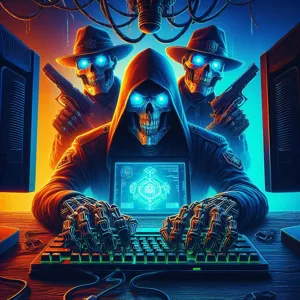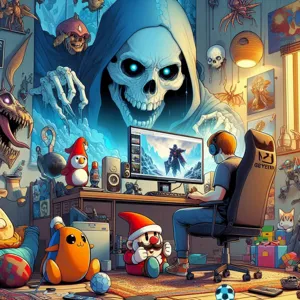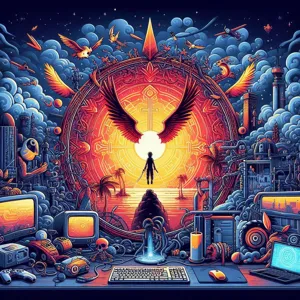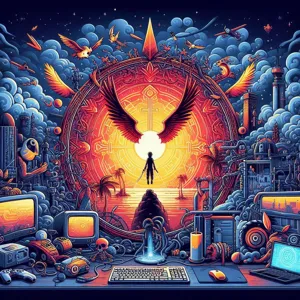In the rapidly evolving landscape of online PC gaming, where competition is fierce and millions of players connect from around the globe, the threat of cheating looms large.
Cheaters disrupt the balance of fair play, tarnishing the experiences of honest gamers and undermining the integrity of the gaming community. As developers strive to create immersive worlds and engaging gameplay, the challenge of preventing cheating becomes ever more critical. This blog post delves into effective strategies that can help level the playing field, ensuring a fair and enjoyable environment for all players. From advanced anti-cheat technologies to community-driven reporting systems and ethical game design, we’ll explore the multifaceted approach needed to combat cheating and foster a vibrant gaming culture where skill, strategy, and sportsmanship reign supreme. Join us as we navigate the complexities of maintaining integrity in the digital arena and discover how you can contribute to a more equitable gaming experience.
1. Introduction: The Rise of Cheating in Online PC Gaming

The online gaming landscape has exploded in popularity over the past decade, drawing millions of players into immersive worlds where competition fuels excitement and camaraderie. However, with this surge in players has come an unsettling rise in cheating. From aimbots that grant players pinpoint accuracy to wallhacks that reveal opponents’ locations, cheating has infiltrated games across genres, undermining the integrity of competition and the enjoyment of fair play.
As gaming communities grow, so do the tactics employed by cheaters, often leveraging sophisticated software that exploits vulnerabilities in game coding. This not only tarnishes the experience for honest players but also poses a significant challenge for developers striving to maintain balanced and engaging environments.
The implications of cheating extend beyond mere frustration; they can decimate player trust and loyalty, leading to dwindling player bases and unsustainable ecosystems. With reports of cheating incidents rising sharply, it’s imperative for both developers and players to collaborate on effective strategies to combat this pervasive issue.
In this blog post, we will explore the multifaceted nature of cheating in online PC gaming, examining its implications and offering actionable strategies to create a fairer, more enjoyable gaming experience for all. By addressing the root causes and implementing robust preventive measures, we can foster a healthier, more competitive environment that levels the playing field for every gamer.
2. Understanding the Types of Cheating in Gaming
To effectively combat cheating in online PC gaming, it’s crucial to first understand the various forms it can take. Cheating is not a monolithic issue; it manifests in numerous ways, each with its own implications for gameplay and community integrity.
One of the most common types is **aimbots**, which artificially enhance a player’s precision, allowing them to hit targets with unerring accuracy. This not only undermines the challenge of the game but also sours the experience for legitimate players who rely on skill and practice. Another prevalent form is **wallhacks**, where players gain the ability to see through solid objects, providing them with an unfair advantage by anticipating enemy movements and positioning.
then there are **speed hacks**, which enable players to move faster than the game allows, making it difficult for others to compete fairly. **Exploits**, on the other hand, involve taking advantage of glitches or bugs within the game to gain an unfair advantage, whether that’s through invulnerability, infinite resources, or other game-breaking benefits.
In addition to these technical cheats, there are also **collusion** and **boosting** practices, where players work together to manipulate game outcomes, undermining the competitive nature of gaming. Understanding these diverse forms of cheating is essential for developers and players alike, as it sets the groundwork for effective prevention strategies. By recognizing how cheaters operate, the gaming community can better protect the integrity of online play and ensure a fair and enjoyable experience for everyone involved.
3. The Impact of Cheating on the Gaming Community

Cheating in online PC gaming reverberates through the entire gaming community, affecting not just the integrity of individual games, but also the overall health of the gaming ecosystem. When a player engages in cheating—whether through hacks, exploits, or bots—it creates an uneven playing field that undermines the efforts of honest players. This disparity fosters frustration and resentment within the community, leading to diminished enjoyment and engagement.
The impact of cheating can be seen in various ways. Firstly, it erodes trust among players. Gamers invest countless hours honing their skills, building strategies, and forming bonds with others. When cheaters exploit the system, it invalidates these efforts, causing players to question the fairness of the competition. Some may even choose to abandon games altogether, resulting in a decline in active user bases and a less vibrant community.
Moreover, the presence of cheaters can tarnish a game’s reputation. New players, seeking a welcoming environment to experience the thrill of competition, may quickly become disillusioned upon encountering blatant cheating. This can lead to negative reviews and a diminished player base, ultimately harming the developers’ efforts to foster a healthy gaming environment. As a result, some developers may face financial repercussions due to lost sales and dwindling engagement, impacting future game development and updates.
Beyond individual games, cheating can fragment communities. Dedicated players often band together to find solutions, creating forums and groups focused on combating cheaters. While this can foster camaraderie, it can also lead to division, with factions forming around different views on how best to handle the situation. Some may advocate for strict punitive measures, while others may call for more leniency and understanding.
In summary, the impact of cheating extends far beyond just the scores on a leaderboard. It disrupts the delicate balance of fair play, erodes trust among players, damages game reputations, and fragments communities. As we continue to explore effective strategies to prevent cheating, we must recognize the broader implications it has on the gaming landscape and strive to cultivate an environment where integrity and fair competition thrive.
4. Importance of Fair Play: Why We Need to Prevent Cheating
In the fast-paced world of online PC gaming, the thrill of competition can quickly be overshadowed by the specter of cheating. The importance of fair play transcends mere enjoyment; it is the foundation upon which the gaming community is built. When players engage in a match, they enter a shared arena governed by rules and mutual respect. Cheating disrupts this balance, creating an environment where skill is overshadowed by exploitation. This not only diminishes the experience for honest players but can also lead to a toxic gaming atmosphere.
Preventing cheating is essential for several reasons. First and foremost, maintaining integrity in gaming fosters a sense of trust among players. When everyone knows that they are competing on a level playing field, they can focus on honing their skills and enjoying the game. This spirit of competition encourages players to invest time and effort into improving their gameplay, leading to a more vibrant and engaged community.
Moreover, the economic implications of cheating cannot be ignored. Many online games operate on a freemium model, where players can purchase in-game items or enhancements. Cheating can skew the economy of these games, leading to dissatisfaction among players who feel their investments are devalued by those who attain success through dishonest means. This dissatisfaction can result in churn, where players abandon games altogether, ultimately harming developers and the community at large.
Furthermore, the reputation of gaming as a whole is at stake. The rise of cheating undermines the legitimacy of competitive gaming, particularly in the burgeoning world of eSports. As spectators and players alike seek out fair and thrilling competitions, the presence of cheaters can tarnish the image of a game, leading to decreased viewership and participation.
In conclusion, preventing cheating is not just about enforcing rules; it is about preserving the essence of gaming itself. By promoting fair play, we nurture a community where players can find joy, challenge, and camaraderie, ensuring that the digital arenas we love remain welcoming and competitive for all.
5. Strategies for Game Developers to Combat Cheating

In the fast-evolving realm of online PC gaming, developers face an ongoing battle against cheating that threatens the integrity of their games and the experience of their players. To combat this pervasive issue, developers must adopt a multifaceted approach that combines technology, community engagement, and continuous improvement.
One of the most effective strategies is the implementation of robust anti-cheat software. These programs utilize advanced algorithms to detect anomalies in player behavior, ensuring that suspicious actions are flagged and investigated. By employing heuristic analysis and machine learning, developers can create systems that adapt to new cheating methods as they arise, making it increasingly difficult for cheaters to exploit the game. Regular updates to these systems can keep players one step ahead of potential threats, giving honest gamers a fair chance to compete.
In addition to technology, transparency is key. Game developers should communicate openly with their communities about the measures they are taking to combat cheating. Regular updates on enforcement actions, such as bans and suspensions, can deter potential cheaters by demonstrating that the developers are vigilant and committed to maintaining a level playing field. Furthermore, involving the community in the reporting process allows players to contribute to the game’s integrity, fostering a collective sense of responsibility and camaraderie.
Another crucial strategy is the use of server-side validation. By processing certain critical game mechanics on the server rather than the client side, developers can reduce the risk of players manipulating the game in their favor. This not only enhances security but also helps maintain consistent gameplay for all users, as the server determines the outcomes based on the game’s rules rather than a player’s potentially altered client.
Finally, fostering a positive gaming environment is essential in preventing cheating. Developers can promote sportsmanship through in-game rewards for fair play, creating a culture that values integrity over victory at any cost. By incentivizing good behavior and discouraging toxic practices, developers can cultivate a community that is more likely to self-regulate against cheating.
By employing these comprehensive strategies, game developers can significantly reduce cheating in online PC gaming, ensuring a fairer and more enjoyable experience for all players. In this ongoing battle, innovation, transparency, and community involvement will be their most powerful allies.
6. Implementing Anti-Cheat Software: Pros and Cons
In the battle against cheating in online PC gaming, implementing anti-cheat software has become a cornerstone strategy for developers and publishers. While this approach offers significant advantages, it also comes with its own set of challenges. Understanding both the pros and cons is crucial for creating a fair gaming environment.
**Pros:**
1. **Enhanced Fairness:**
The most obvious benefit of anti-cheat software is the promotion of a level playing field. By detecting and preventing cheating, developers can ensure that skill and strategy, rather than illicit advantages, dictate the outcome of games. This not only fosters a fair competitive atmosphere but also enhances the overall gaming experience for all players.
2. **Increased Player Retention:**
Players are more likely to stick around in a game where cheating is minimized. A clean, fair environment encourages player engagement and loyalty, translating to a larger, more active community. This can lead to increased sales and continued support from the gaming community.
3. **Reputation Boost:**
Developers who actively combat cheating can improve their brand reputation. Gamers are more inclined to support a company that prioritizes integrity and fairness in its gaming ecosystem. Positive word-of-mouth can significantly enhance a game’s profile, attracting new players who are seeking a trustworthy gaming experience.
**Cons:**
1. **Privacy Concerns:**
One of the major criticisms of anti-cheat software is its potential intrusion into players’ privacy. Many anti-cheat systems require extensive permissions, accessing system files, and monitoring user behavior, which can raise ethical questions and deter some players from participating.
2. **False Positives:**
No anti-cheat system is perfect, and false positives can alienate legitimate players. When innocent players are mistakenly flagged as cheaters, it can lead to frustration and a negative gaming experience, prompting them to abandon the game altogether.
3. **Resource Drain:**
Implementing and maintaining anti-cheat software can be resource-intensive. Developers must continuously update the software to adapt to new cheating methods, which can divert attention and resources away from other critical areas of game development, such as content creation or user experience improvements.
In conclusion, while implementing anti-cheat software can significantly reduce cheating and improve the gaming experience, it is essential for developers to carefully weigh these pros and cons. Striking a balance between player security, privacy, and fairness is key to fostering a vibrant, competitive online gaming community.
7. Encouraging Community Reporting and Moderation

In the dynamic world of online PC gaming, fostering a strong sense of community can be one of the most effective strategies to combat cheating. Encouraging players to engage in community reporting and moderation not only empowers them but also cultivates a culture of accountability and integrity within the gaming environment.
Implementing a robust reporting system is essential. This system should be easily accessible and user-friendly, allowing players to report suspicious behavior or suspected cheaters with minimal hassle. Transparent guidelines on what constitutes cheating will help players understand the importance of their reports. Providing feedback on how their reports have led to action can reinforce their role in maintaining a fair gaming atmosphere.
In addition to reporting, creating a community moderation team can be a game-changer. By enlisting dedicated players who are passionate about fair play, developers can foster a sense of ownership and responsibility within the community. These moderators can assess reports, monitor gameplay in real-time, and even participate actively, setting an example for others.
Furthermore, hosting regular community events that reward players for their vigilance can bolster engagement. For example, rewarding players with in-game currency, exclusive items, or recognition within the gaming community for their efforts in reporting cheating can motivate more players to take an active role in maintaining integrity.
Lastly, open communication channels between developers and the player base about the measures taken to address cheating can build trust. Regular updates on anti-cheat initiatives, statistics on cheaters banned, and success stories of community-led moderation efforts will keep players informed and invested in the fight against cheating.
By encouraging community reporting and moderation, game developers not only strengthen their defenses against cheaters but also enrich the player experience, making for a more enjoyable and fair gaming environment for everyone involved.
8. Utilizing Machine Learning and AI to Detect Cheating
In the ever-evolving landscape of online PC gaming, cheating remains a persistent challenge that can undermine the integrity of gameplay and the experience of honest players. To combat this, game developers are increasingly turning to the sophisticated capabilities of machine learning (ML) and artificial intelligence (AI) to detect and prevent cheating in real-time. These advanced technologies offer a proactive approach to identifying suspicious behavior and maintaining a fair gaming environment.
Machine learning algorithms can analyze vast amounts of gameplay data to establish a baseline of normal player behavior. By recognizing patterns and deviations from this norm, these systems can flag potential cheaters for further investigation. For example, if a player consistently achieves headshots at an improbable rate or moves with supernatural precision, the ML model can raise an alert. This data-driven approach allows for a level of scrutiny that manual reporting and traditional detection methods simply cannot achieve.
AI can also enhance the gaming experience by adapting to evolving cheating techniques. As cheats become more sophisticated, so too must the systems designed to counteract them. Machine learning models can be trained on new datasets that include the latest cheating methodologies, allowing them to evolve and improve over time. This adaptability is crucial, ensuring that anti-cheat measures remain effective against a constantly shifting landscape of cheats and hacks.
Moreover, integrating AI into cheat detection processes can lead to quicker responses. Automated systems can analyze gameplay in real-time, enabling developers to take immediate action against suspected cheaters—whether that means issuing a temporary ban, conducting further investigation, or removing them from a current match. This swift response not only protects the integrity of the game but also reinforces a sense of fairness among the player community.
While no anti-cheat system is foolproof, the incorporation of machine learning and AI provides a formidable line of defense against cheating in online PC gaming. By harnessing the power of these technologies, developers can create a more equitable gaming environment, fostering a community where skill and dedication prevail over deceit. As players enjoy their favorite titles, they can feel confident knowing that steps are being taken to level the playing field and preserve the spirit of competition.
9. Regular Updates and Patching: Keeping Games Secure
In the fast-paced world of online PC gaming, the integrity of a game can be compromised by the emergence of cheats and exploits. To combat this, regular updates and patching are essential strategies that developers must prioritize. These updates not only enhance gameplay but also serve as a crucial line of defense against malicious activity.
Each patch should contain bug fixes that address vulnerabilities in the game’s code, which cheaters often exploit to gain an unfair advantage. Developers must be vigilant, continuously monitoring player feedback and behavior to identify emerging threats. By analyzing data from gameplay and reports from the community, developers can pinpoint weaknesses and swiftly implement solutions.
Moreover, frequent updates signal to players that the developers are committed to maintaining a fair playing environment. This fosters a sense of trust and community among gamers, encouraging them to engage more deeply with the game. When players see that their concerns are being addressed and that the game is evolving, they are more likely to return and invest their time and resources.
In addition to fixing known issues, regular updates can introduce new content, features, and gameplay mechanics that keep the experience fresh and exciting. This not only enhances player engagement but also draws attention away from cheating methods, as the focus shifts to exploring new elements of the game.
Ultimately, maintaining a robust update schedule is crucial for any online game looking to prevent cheating. It requires a proactive approach, where developers are not just responding to issues as they arise but anticipating and mitigating them before they become widespread problems. By staying one step ahead, developers can ensure a fair and enjoyable gaming experience for everyone, leveling the playing field and keeping the community thriving.
10. Educating Players About Fair Play Practices
Educating players about fair play practices is a cornerstone strategy in preventing cheating in online PC gaming. It’s essential to foster a gaming culture that values integrity and sportsmanship, and this begins with comprehensive education initiatives that resonate with both new and seasoned players.
Start by creating informative resources—guides, videos, and articles—that elucidate the importance of fair play. Highlight the negative impacts of cheating not only on the gaming experience but also on the community at large. Use real-life examples to illustrate how cheating can diminish the thrill of competition, lead to a toxic environment, and undermine the commitment of developers who strive to create balanced gameplay experiences.
Incorporate these educational materials into your onboarding process for new players, ensuring that they understand the rules and expectations from the outset. Host webinars or live discussions featuring respected members of the gaming community or industry leaders who can share insights on the value of competition without shortcuts. Gamers often look up to these figures, and their endorsement of fair play can make a significant impact.
Additionally, utilizing in-game reminders that reinforce fair play can help keep this ethos at the forefront of players’ minds. Simple messages encouraging respect for fellow gamers and a reminder of the consequences of cheating can go a long way in nurturing a culture that prioritizes fairness.
To further engage players, consider implementing rewards for those who exemplify good sportsmanship—recognition programs that highlight players who contribute positively to the community can serve as a powerful incentive and encourage others to follow suit. By proactively educating players about fair play practices, you are not just enforcing rules; you are cultivating a passionate and respectful gaming environment where everyone can thrive.
11. The Role of Player Behavior and Accountability
In the world of online PC gaming, the integrity of the game relies not just on sophisticated anti-cheat systems but also on the behavior and accountability of the players themselves. Building a community that actively discourages cheating is as crucial as any technological solution. This starts with establishing a culture of respect and fair play, where players understand the impact of their actions not only on their own experience but on the enjoyment of others as well.
Encouraging players to report suspicious behavior fosters a sense of collective responsibility. Game developers can enhance this by implementing straightforward reporting systems that are user-friendly and responsive. When players feel empowered to report cheaters without fear of backlash, it paves the way for a more vigilant community. Additionally, developers can create awareness campaigns that highlight the consequences of cheating, from temporary bans to permanent account suspensions, reinforcing the message that cheating undermines the community.
Beyond reporting, accountability can be nurtured through community-driven initiatives such as player-led moderation teams or forums where players can discuss behaviors and share their gaming experiences. These platforms can serve as safe spaces for players to voice their concerns about cheating and collaborate on solutions, fostering a stronger bond among community members.
Moreover, recognizing and rewarding positive player behavior can also play a significant role. Implementing systems that allow for recognition of fair play—be it through achievements, badges, or even shout-outs in community forums—can motivate players to uphold standards of integrity. When players see that their efforts to maintain a fair environment are valued, they are more likely to contribute positively and hold one another accountable.
Ultimately, the fight against cheating in online PC gaming isn’t solely a battle of technology; it’s a shared commitment among players to create a fair and enjoyable gaming experience. By championing player behavior and accountability, developers and gamers alike can work together to level the playing field, ensuring that the spirit of competition thrives in a fair and just gaming environment.
12. Collaborating with Gaming Platforms and Services
In the ever-evolving landscape of online PC gaming, collaboration is key to combating the pervasive issue of cheating. By partnering with gaming platforms and services, developers can leverage a wealth of resources, technology, and expertise to create a more secure gaming environment. This approach not only enhances the integrity of the game but also fosters a community where fair play is championed.
First and foremost, developers should engage with platform providers like Steam, Epic Games, or Origin. These giants possess robust anti-cheat systems and vast amounts of data that can be invaluable in identifying cheating patterns. By working together, developers can integrate advanced detection tools into their games, ensuring that cheating methods are swiftly identified and neutralized.
Moreover, collaborating with third-party anti-cheat services can provide an additional layer of protection. These specialized companies are dedicated to staying one step ahead of cheaters and can offer innovative solutions such as real-time monitoring and automated reporting systems. Implementing these technologies can significantly reduce the window of opportunity for cheaters, making their tactics less effective.
In addition to technological partnerships, fostering a strong relationship with the gaming community is essential. By actively engaging with gamers on forums, social media, and during live streams, developers can gather valuable feedback about potential loopholes or cheating tactics that players encounter. This open line of communication not only helps in addressing concerns promptly but also builds trust between players and developers.
Lastly, collaborating with esports organizations can help raise awareness about the importance of fair play. By promoting tournaments and events that prioritize integrity, developers can highlight the consequences of cheating and celebrate the triumphs of legitimate players. This not only discourages cheating but also reinforces a culture of respect and sportsmanship within the gaming community.
In summary, collaboration with gaming platforms, third-party services, and the player community is essential in the fight against cheating in online PC gaming. By pooling resources and knowledge, developers can create a more secure and enjoyable gaming experience that levels the playing field for all players.
13. Case Studies: Successful Anti-Cheat Implementations
In the ever-evolving landscape of online PC gaming, numerous developers have risen to the challenge of combating cheaters, employing innovative strategies that not only safeguard the integrity of their games but also enhance the overall player experience. By analyzing successful anti-cheat implementations, we can glean valuable insights into what works in this ongoing battle against unfair practices.
Take **Riot Games’ Valorant** as an example. From its launch, the developers recognized the potential for cheating to mar its competitive environment. To counteract this, they introduced *Vanguard*, a robust anti-cheat system that operates at the kernel level. This proactive approach allows Vanguard to detect cheats before they even enter the game. By creating a transparent process that informs players of its capabilities, Riot Games has cultivated a community that feels secure and valued, significantly reducing instances of cheating and fostering a more competitive atmosphere.
Another notable case is **Epic Games’ Fortnite**. With its massive player base and frequent updates, Fortnite faced a unique challenge in maintaining fair play. Epic implemented a multi-faceted strategy incorporating machine learning algorithms to identify cheating patterns and behaviors. By continuously analyzing player data and swiftly adapting to new cheating methods, Fortnite has been able to effectively deter many would-be cheaters. Moreover, the company’s commitment to community engagement, including regular communication about anti-cheat measures and community feedback loops, has helped build trust and accountability among players.
**Call of Duty: Warzone** also deserves mention for its aggressive stance against cheating. Infinity Ward has continually updated its anti-cheat protocol, employing both automated systems and manual review processes. The introduction of *perma-bans* for detected cheaters, along with weekly updates announcing the number of banned accounts, sends a strong message about the seriousness of their commitment to fair play. This transparency not only discourages cheating but also reassures the legitimate player base that their gaming experience is being protected.
These case studies highlight that successful anti-cheat strategies are not just about technology; they also involve fostering a community-centric approach. By openly communicating with players, being transparent about the measures being taken, and continuously adapting to emerging threats, game developers can effectively reduce cheating and cultivate a loyal player base. As the industry continues to grapple with the challenges posed by cheaters, these examples serve as a testament to the importance of innovative, responsive, and community-focused anti-cheat implementations.
14. Future Trends in Anti-Cheat Technologies
As the landscape of online PC gaming continues to evolve, so too does the technology designed to combat cheating. The future of anti-cheat measures promises to be both innovative and sophisticated, leveraging advancements in artificial intelligence, machine learning, and blockchain technology to create a fairer gaming environment for all players.
One of the most exciting trends is the integration of AI-driven algorithms that can analyze gameplay patterns in real-time. These systems are designed to identify anomalies indicative of cheating, such as aimbots or wallhacks, by establishing a baseline of normal behavior for each player. Instead of relying solely on manual reporting or outdated detection methods, AI can swiftly adapt and learn, enhancing its effectiveness over time. This proactive approach not only minimizes false positives but also ensures that genuine players are not unjustly penalized.
Additionally, the rise of blockchain technology presents intriguing possibilities for transparency and accountability in gaming. By recording player actions on a decentralized ledger, developers can create immutable records of gameplay that can be audited independently. This transparency can deter cheating by making it nearly impossible to manipulate in-game data without detection.
Moreover, the gaming community itself is becoming increasingly involved in anti-cheat efforts. Crowdsourcing cheat detection through player reports, combined with community-driven initiatives, can empower gamers to take an active role in maintaining the integrity of their favorite titles.
As we look ahead, we can expect to see a collaborative approach where developers, players, and technology converge to create more secure and enjoyable gaming experiences. By investing in advanced anti-cheat technologies and fostering a culture of fairness and respect, the gaming industry can level the playing field, ensuring that skill and strategy remain at the forefront of competition.
15. Conclusion: Building a Fair and Enjoyable Gaming Environment
In conclusion, creating a fair and enjoyable gaming environment is essential for fostering a vibrant and engaged community in online PC gaming. As we’ve explored throughout this post, the prevalence of cheating not only undermines the integrity of the game but also alienates honest players who seek challenge and camaraderie. By implementing effective strategies—such as robust anti-cheat systems, transparent reporting mechanisms, and active community engagement—game developers and players alike can work together to uphold the spirit of competition.
Moreover, it’s vital to cultivate a culture of respect and sportsmanship within the gaming community. Encouraging players to hold each other accountable and promoting positive interactions can significantly reduce instances of cheating. Education plays a key role here; informing players about the consequences of cheating and the benefits of fair play can shift mindsets and reinforce a sense of shared responsibility.
Ultimately, the goal should be to level the playing field, allowing every player the opportunity to enjoy the game as it was intended. By prioritizing fairness and integrity, we can transform online PC gaming into a more rewarding experience that celebrates skill, strategy, and teamwork. Together, let’s commit to building an environment where every match is a true test of ability, and every player can take pride in their achievements. With these strategies in place, the future of online gaming can be bright, competitive, and, most importantly, fair for all.
As we conclude our exploration of effective strategies to prevent cheating in online PC gaming, it’s evident that fostering a fair gaming environment benefits everyone involved—from novice players to seasoned veterans. By implementing robust anti-cheat measures, encouraging community vigilance, and promoting transparency within gaming platforms, we can collectively safeguard the integrity of our beloved games. Remember, a level playing field not only enhances the gaming experience but also nurtures a sense of camaraderie and respect among players. We hope you found these strategies insightful and actionable. Let’s work together to keep our gaming communities vibrant and fair, ensuring that every player can enjoy the thrill of competition without the shadow of cheating. Happy gaming!








